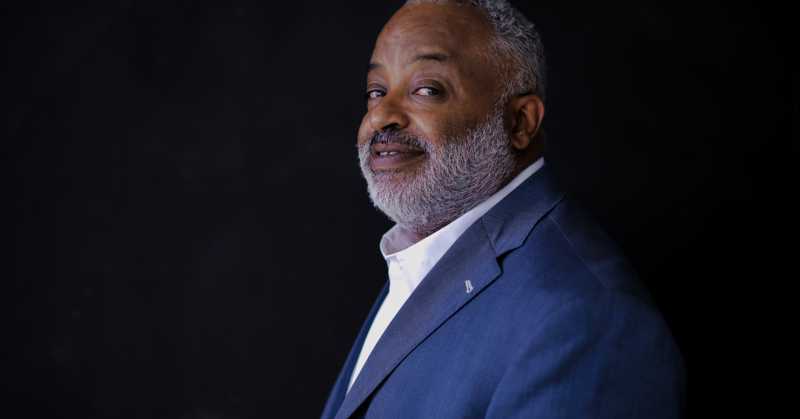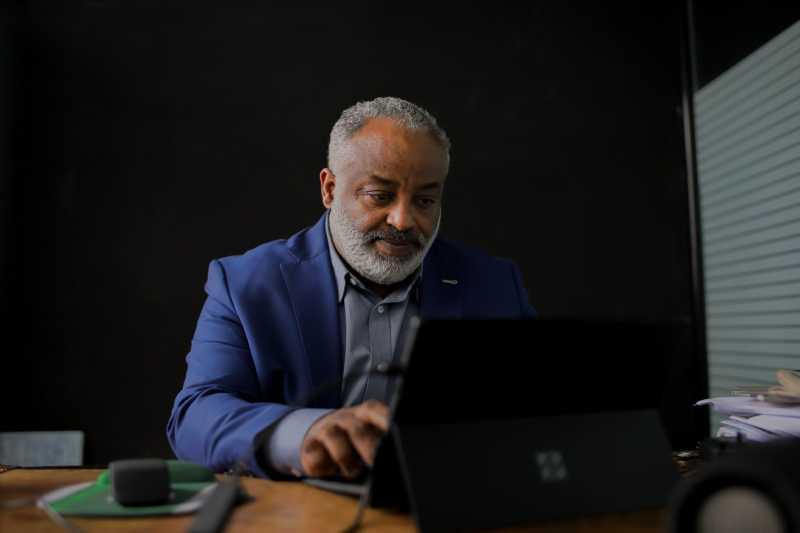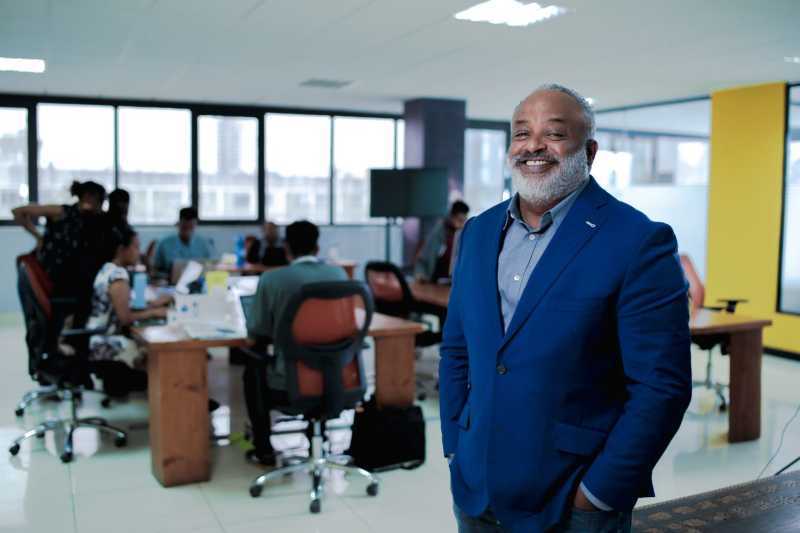Addis Alemayehou: An Exclusive Interview with Loline Mag

Addis Alemayehou is the founder and CEO of 251 Communications, Ethiopia’s leading communications and branding company. He’s also the co-founder of Kana TV, Ethiopia’s first TV station to dub international content into Amharic.
Addis Alemayehou, a 50-year-old serial entrepreneur, is passionate about his people, country, and family. In our exclusive interview with Addis, he described himself as follows: "50 is such an important age! It's the age where you begin to contemplate the question of how you would like to be remembered, the legacy you want to leave behind. Besides, My name in itself, Addis Alemayehou, is very common amongst prominent Ethiopians, which is also something to live up to."
Growing up, Addis despised going to school. He recalls, "It was in fifth grade when a teacher named Mr. Luis walked in and wrote letters and numbers in a math class that I broke up with school." His father used to tell him that he was a bright child who just never strived hard enough. On the other hand, Addis's older sister was academically strong and goal-oriented from an early age.
After graduating from high school in the United States, Addis Alemayehou attended the University of Toronto in Canada full-time for two semesters before starting work and going to school part-time to help himself financially. After a while, he decided to drop out of University. Addis told Loline about his college years, "By the time I was 19, I had three properties (housing). So, I was already on the business side, hustling and making money. I didn't see the need to sit in a class when I could have been outside earning money. My parents were disappointed, but because they saw that I was responsible for my time and money, they were convinced otherwise. It may not have been the best decision, but I don't regret making it at all. However, this is not for everybody. As for my sister, it was different. She graduated, took the right internship, did the right job, and became successful. But I had my own journey to take, so I took it."
About the current school system, Addis says, "The school's curriculum has been in place for over 100 years, and it is something that should be revisited. Especially in Ethiopia, where there's a lot of work to be done. When I look at how my children are being educated, I see that adjustments must be made to the system. Looking at my daughter, who is just like me, a hustler, people's person, creative, and artistic, and then looking at my son, who is the polar opposite, I have come to believe that the school's curriculum can not be the same for everybody because not everyone is the same. You can't expect an artistic child to pay attention in a science class. There has to be a way to channel each individual's inner needs and combine it with the proper education."
While in Canada, Addis faced difficulties with his landlord. He worked as a room service clerk in a hotel where he stayed for about four years. At the hotel, he had a friend that was a Chef. His friend also faced problems with the landlord and told Addis about it. Then, they asked each other, "Why don't we buy a house together?; Why are we paying rent?" They bought their first property and gradually added three more. They rented out the rooms and used the proceeds to cover the mortgages. Addis remarked, "If I hadn't left Canada, I would have still been in the real estate business. However, I always wanted to come home."
"There was one question that everybody asked me regularly, which was, where are you from?" Addis said of his decision to return to Ethiopia. Addis went on, "When you hear this question, it can signal either of the following; One is that they genuinely want to know where you're from, and the other is an implicit way of reminding you that you don't belong there. The latter prevents you from having a sense of belonging in the country. I came to Ethiopia in 1994. As soon as I entered the airport, for the first time in years, I felt at home."

In the late 90s, Africa was a hotspot for mobile licensing. The continent was shifting from landlines to mobile. Addis wanted to use this opportunity to set up a mobile network in his home country. At that time, Ethiotelecom was starting to operate and had a small user base. The network also worked only in Addis Ababa. Therefore, Addis wrote emails to MTN and Vodacom, large Telecom companies with operations in Africa, asking for collaboration. MTN claimed they already had a partner, but Vodacom invited him to come to their headquarters to speak with them. Addis then went to South Africa in 1998 and signed an MOU to start a mobile operation in Ethiopia. "...and as you know, it is only in 2021 that the government allowed other Telecom companies to operate in Ethiopia. So, you need a bit of patience to work in this country.", Addis added.
After his first venture did not work out with Vodacom, Addis joined USAID as a consultant and worked on export promotion under AGOA (African Growth and Opportunity Act). Addis said, "When AGOA was first launched, nobody knew about it. So, we worked on pushing AGOA to different organizations and helped them, so that they can have a proper understanding of it. It was the ideal approach for me to meet new people and learn how things operated in the country. People who grew up in Ethiopia have an advantage because they have connections. They would probably have childhood friends in key places, which is a huge gap for us diasporas, especially those who left the country at a very young age. The experience I gained and the connections I created while working at USAID have helped and continue to help me to this day."
"Most of the businesses that I've established were inspired by difficulties that others or I have had." Addis continued, "If you find a problem and bring a solution to that problem at the right price, you create a business." When Addis came to Ethiopia, there was no private FM Radio station. He used to drive his father's car, and every time he drove, he brought his iPod with him in order to listen to music. One time his iPod broke, and he couldn't find anything to listen to while driving. He also observed that people kept several music CDs in their trunks. Furthermore, while working at USAID, Addis noticed that there were a lot of foreigners in the country who had no way of accessing basic information about Ethiopia. And that is how Afro FM, the first-ever all-English radio station, was born.
After launching Afro FM, Addis saw a need for a communication and marketing company in Ethiopia. With only a few marketing agencies providing their services in the country, he saw a gap in the market. For example, if an agency worked with Coca-Cola, that same agency couldn't work with Pepsi. Addis also noticed that global brands like Heineken were, at the time, expanding to Ethiopia, which he saw as an opportunity to establish an advertising firm. As a result, Addis launched 251 Communications, a marketing and communication firm. Addis stated, "An advertising agency gives you a lot of insights and challenges from clients, which in turn provides you with a lot of opportunities."
251 Communications worked on several advertisements for clients; however, there were only two TV stations to choose from for brands to advertise. "Having only two TV stations for an entire country of more than 100 million people is mind-boggling to the outside world," Addis added. This need stirred up an idea in his mind to start a TV channel. His first instinct was to bring MTV, an American cable channel, to Ethiopia. However, he realized that the manufacturing and licensing costs to set it up would be prohibitively expensive. Addis was then given suggestions from several people to launch his own television channel. He discussed it with his friend and decided to do some research. After the research, they observed that there was a growing demand for movies and shows. So, they partnered up with Moby Media Group, a large media company in Afghanistan, to start Kana, a TV channel with a simple concept of dubbing foreign shows in Amharic. At first, due to the lack of data and statistics, the Moby group was hesitant to work in Ethiopia as they were not yet convinced of the demand. Addis then took some people from the group to a neighborhood called Kazanchis in Addis Ababa. He brought them to the top of a building and showed them the countless satellite dishes on the rooftops of several homes. He told them that all those houses they saw were their potential clients. And that's how the group became convinced to work in Ethiopia.
After establishing Kana TV, Addis shifted his focus to investment. He said, "I saw that most young Ethiopians had great ideas and were energetic but didn't have the financial resources to bring their ideas to life." Addis then joined a TV show called "Chigign Tobiya" as an investor. The show provided a platform where entrepreneurs presented their businesses to a group of investors. After Chigign Tobiya, people started approaching him seeking investments. Addis has now invested in many companies. He eventually established a group called Kazana to manage the companies he has invested in so far. In Swahili, Kazana is related to hardworking and hustling. Addis said, "I wanted Kazana to be an African enterprise and not just an Ethiopian one."

A toddler doesn't start running right after it's born, it takes time, and a business is just like that.
When asked about the traits that he looks for in the businesses he invests in, Addis answered, "The first thing I look at is the team or the person who started the business and the efforts that they have put into it. I want to know whether they have done rigorous research and are aware of their competitions since most of those that come to me say that they don't have any competition. I also look at how disciplined they are and if they are open-minded and flexible with their business. Last but not least, I obviously see the numbers; because, at the end of the day, I want a return on my investment."
Addis remarked, "I always say that Ethiopia is like watching a movie for the second time. You don't have to go anywhere else. Simply look at our neighboring country, Kenya, where it takes you a couple of hours to set up a company; banks will lend you money just for your idea. I'm certain that they are at least 10 to 15 years ahead of us. I see the level of innovation there, and it amazes me. I know that it is going to happen in Ethiopia as well, sooner or later. I am not saying that Kenya is Utopia; they also still have a long way to go."
"Kenya has always been a capitalist and a business-oriented country. And most of the politicians are business owners or entrepreneurs." Addis continues, "When you come to Ethiopia, even the word business owner, in Amharic 'Negade', was considered an insult in the culture and society. Unfortunately, that mentality is still there. One thing I propose we do is to change the perception of the word Negade. It is us, the Negades or the Entrepreneurs, that will help develop the country. We do that by creating jobs and opportunities for others. As for us, we have created around 400 jobs across many sectors. I usually tend to assess the wealth of a certain company by the number of employees it has."
"Most Ethiopian startups and businesses lack data and financing. Data and statistics are scarce, which are vital in starting a business. If Ethio Telecom had made their data and statistics publicly available, they would have been able to help numerous businesses. The other thing startups and businesses lack is finance, both from the government and the private sector. It is because of the latter that many people come to us seeking investment. I am aware that the government is considering creating a startup fund, which would be fantastic. It would be even better if they make it a revolving fund where one startup takes a loan and repays it for another to borrow."
We asked Addis about the challenges he has faced as an Entrepreneur, and he answered, "A toddler doesn't start running right after it's born, it takes time, and a business is just like that. These days, people, specifically the young generation in Ethiopia, want to start a business quickly: buy furniture and set up an office; employ a secretary; and buy a Vitz or any other car. They don't see and realize how long it took me to be where I am today. I used to borrow from my friends to pay the salaries of my employees. And to this day, I still borrow in cases where our cash flow is tight. Being an Entrepreneur is not easy. Many people depend on you for their livelihood, and that is stressful."
For the Entrepreneurs, Addis advised, "Focus, do your research, and never give up. Also, hang out with people that are smarter, more educated, and more experienced than you. You have friends and colleagues, and you need that, but you also need to have people that you can look up to. I myself also hang out with smarter and more experienced people than me. They give me insights and different perspectives". "You also need to read," he added. "This generation is very lucky to have Google and YouTube to teach them."

Addis concluded by saying,
"Ethiopia is the number one place in the world where it's full of opportunities. Whatever the world has already gone through, we are just about to go through it. Be it e-commerce, fintech, or whatever else you can think of, it is yet to arrive in Ethiopia. It is an exciting opportunity, especially for the youth."
